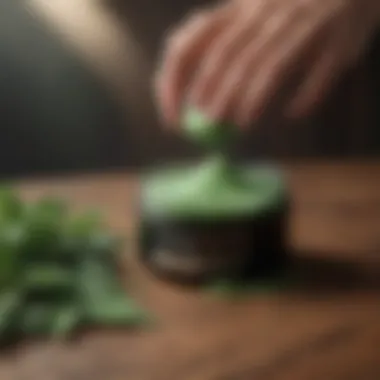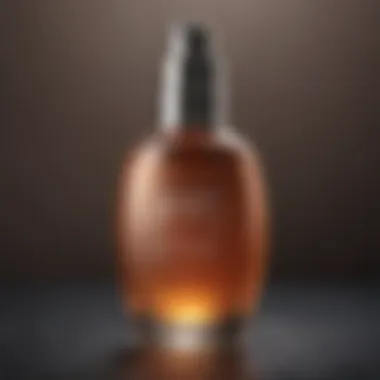Exploring Effective Solutions for Hair Care Challenges: A Comprehensive Guide


Hair Care Solutions and Strategies
Hair care is a multifaceted realm that often presents individuals with a myriad of challenges, necessitating the need for effective solutions and strategies to navigate through them successfully. In this comprehensive guide, we will delve into the intricacies of hair care, offering expert advice and practical tips on overcoming common issues such as hair loss, damaged hair, and styling conundrums.
Unveiling the Challenges of Hair Care
Before embarking on the journey of enhancing your hair care routine, it's essential to understand the primary challenges many individuals face. Hair loss, whether due to genetic predisposition or external factors, can be distressing and impact one's confidence. Damaged hair, caused by heat styling or chemical treatments, requires special attention to restore its health and vitality. Additionally, styling difficulties can pose daily frustrations, making it crucial to seek effective solutions.
Embracing Practical Solutions
Navigating the world of hair care becomes more manageable when armed with the right knowledge and tools. Investing in high-quality hair products suited to your hair type can work wonders in rejuvenating your locks and combating issues like dryness or breakage. Embracing natural remedies, such as coconut oil or aloe vera, can provide nourishment and strengthen your hair from within. Furthermore, adopting a consistent hair care routine tailored to your needs is key to achieving long-term success.
Expert Insights and Recommendations
Seeking advice from hair care experts and professionals can offer valuable insights into personalized solutions for your hair concerns. Whether it's consulting with a trichologist for severe hair loss or receiving styling tips from a seasoned hairstylist, expert recommendations tailored to your specific needs can elevate your hair care journey. Additionally, staying informed about the latest trends and innovations in the hair care industry enables you to make informed decisions regarding products and treatments.
Conclusion: Elevating Your Hair Care Experience
Understanding Hair Loss
Hair loss is a significant concern for many individuals, as it can impact one's appearance and self-esteem. In the context of this article, understanding hair loss is crucial to addressing the root causes and implementing effective solutions. By delving into the various aspects of hair loss, readers will gain valuable insights into why it occurs and how they can combat it. This section will explore the causes, types, and preventive measures associated with hair loss, offering a holistic view of this common issue.
Causes of Hair Loss
Genetic Factors
Genetic factors play a crucial role in determining an individual's likelihood of experiencing hair loss. These hereditary traits can influence the hair growth cycle, leading to conditions such as male pattern baldness or female pattern hair loss. Understanding the genetic components of hair loss is essential for developing personalized treatment plans and managing expectations. While genetic factors are largely beyond one's control, knowing how they contribute to hair loss can help individuals make informed decisions about their hair care routines.
Hormonal Imbalance
Hormonal imbalance can significantly impact hair health by disrupting the natural hair growth cycle. Fluctuations in hormones, such as androgens or thyroid hormones, can lead to thinning hair or excessive shedding. By addressing the underlying hormonal issues, individuals can often mitigate the effects of hair loss and promote healthier hair growth. Recognizing the signs of hormonal imbalance and seeking professional advice are crucial steps in managing hair loss effectively.
Stress and Lifestyle
Stress and lifestyle factors can also play a significant role in hair loss. Chronic stress can trigger hair shedding and contribute to conditions like telogen effluvium, where hair prematurely enters the resting phase. Additionally, poor lifestyle choices, such as unhealthy diet or lack of sleep, can affect overall hair condition. By addressing stressors and implementing healthy habits, individuals can support their hair's vitality and reduce the risk of excessive hair loss.
Types of Hair Loss
Androgenetic Alopecia
Androgenetic alopecia, commonly known as male or female pattern baldness, is a genetic condition that results in progressive hair thinning. This type of hair loss typically follows a specific pattern, with hair receding at the temples or crown in men and overall thinning in women. Understanding the characteristics of androgenetic alopecia is essential for exploring treatment options and managing expectations regarding hair regrowth.
Alopecia Areata
Alopecia areata is an autoimmune condition characterized by sudden hair loss in round patches on the scalp. The exact cause of this condition is unknown, but it is believed to involve the immune system mistakenly attacking hair follicles. Individuals with alopecia areata may experience cycles of hair loss and regrowth, making it a challenging condition to predict and manage. By understanding the unique features of alopecia areata, individuals can seek appropriate treatment and support.
Telogen Effluvium
Telogen effluvium is a temporary form of hair loss that occurs when a significant number of hair follicles prematurely enter the resting phase. This condition is often triggered by physiological stressors such as illness, surgery, or hormonal changes. While telogen effluvium usually resolves on its own once the underlying trigger is addressed, it can be distressing for individuals experiencing sudden hair shedding. Recognizing the characteristics of telogen effluvium is essential for determining appropriate coping strategies and monitoring hair regrowth progress.
Preventive Measures
Balanced Diet and Nutrition


A balanced diet rich in essential nutrients is crucial for maintaining healthy hair growth and preventing excessive hair loss. Nutrients like protein, vitamins, and minerals support hair follicle function and overall scalp health. Incorporating a variety of nutrient-dense foods into one's diet can promote luscious, resilient hair and reduce the risk of nutritional deficiencies that can contribute to hair loss.
Scalp Care Regimen
Proper scalp care is fundamental to maintaining a healthy environment for hair growth. Regular cleansing, exfoliation, and moisturization can help prevent scalp conditions that may hinder hair follicle function. Choosing mild, effective hair care products suited to one's scalp type can promote optimal hair health and reduce the likelihood of excessive shedding or breakage. Developing a consistent scalp care routine tailored to individual needs is key to preventing hair loss and promoting vibrant, strong hair.
Reducing Stress Levels
Managing stress levels effectively is essential for maintaining overall health and reducing the impact of stress-related hair loss. Incorporating stress-reducing activities like meditation, yoga, or mindfulness practices can help alleviate tension and promote a sense of well-being. By prioritizing stress management techniques in daily routines, individuals can support their hair's natural growth cycle and minimize the effects of chronic stress on hair health.
Repairing Damaged Hair
Repairing damaged hair is a crucial aspect of this article on navigating the world of hair care. Hair damage can result from various factors such as heat styling, chemical treatments, and overwashing. It is essential to address these issues to maintain healthy, vibrant hair. By focusing on repairing damaged hair, individuals can restore strength, shine, and overall hair health. This section will explore effective remedies and professional treatments to combat hair damage.
Common Causes of Hair Damage
Heat Styling
Heat styling involves using tools like flat irons, curling wands, and hair dryers to achieve desired hairstyles. Despite its popularity for creating sleek looks, excessive heat styling can lead to dryness, brittleness, and breakage. It is important to use heat protectant sprays and regulate the temperature of styling tools to minimize damage. While heat styling offers quick styling solutions, it is essential to balance it with protective measures to prevent long-term harm to the hair.
Chemical Treatments
Chemical treatments, including coloring, perming, and straightening, can alter the hair's structure and texture. While these treatments can provide versatility in styling, they also have the potential to weaken the hair shaft and cause breakage. Understanding the ingredients in chemical products and opting for treatments from reputable salons can help reduce the risk of damage. Balancing chemical treatments with nourishing hair masks and conditioners can help maintain hair health.
Overwashing
Overwashing the hair by shampooing too frequently can strip the hair of its natural oils, leading to dryness and frizz. While cleanliness is important for scalp health, overwashing can disrupt the natural balance of sebum production. Individuals with oily hair may overwash to combat greasiness, but this can exacerbate the issue. Using gentle, sulfate-free shampoos and incorporating dry shampoo into the routine can help extend the time between washes and preserve the hair's natural oils.
In this comprehensive guide to hair care, we delve into the intricate realm of styling strategies tailored for all types of hair. The relevance of understanding and implementing these strategies cannot be overstated when aiming to achieve and maintain healthy, luscious locks. Each hair type presents unique characteristics that demand specific attention and care to enhance its natural beauty and health.
Haircuts for Different Textures
Curly Hair
Curly hair possesses a distinct texture that requires specialized care to maintain its vitality. The key characteristic of curly hair lies in its natural bounce and voluminous appearance. Embracing curly hair in this article showcases the value of celebrating natural beauty. The unique spiral pattern of curly hair contributes to its visual appeal, though it can be challenging to manage at times due to potential frizz. Understanding how to care for curly hair is essential for ensuring its healthy growth and maintaining its striking appearance.
Straight Hair
The sleek nature of straight hair plays a pivotal role in the realm of hairstyling. Straight hair's inherent smoothness and shine make it a favorable option for various hairstyles. Its key characteristic lies in its minimalistic yet elegant appearance, which offers versatile styling options. While straight hair lends itself well to many hairstyles, it may lack volume compared to other textures, requiring specific techniques to enhance its body and texture.
Wavy Hair
Wavy hair blends elements of both straight and curly textures, striking a harmonious balance between the two. Its key characteristic lies in the gentle waves that add dimension and movement to the hair. Wavy hair's versatility makes it a popular choice for those seeking a texture that offers both definition and manageability. Despite its adaptability, wavy hair may require specific styling products to accentuate its natural texture and prevent frizz.
Heat-Free Styling Options
Braiding Techniques
Braiding techniques offer a heat-free styling alternative that not only enhances the aesthetic appeal of the hair but also promotes its health. The key characteristic of braiding techniques lies in their ability to create intricate patterns and textures without the need for heat styling tools. This makes braiding a popular choice for individuals looking to experiment with diverse hairstyles while minimizing heat damage to the hair. While braiding can be a creative styling option, improper braiding techniques may lead to hair breakage or scalp tension if not executed carefully.
Twists and Buns
Twists and buns provide a chic and effortless way to style the hair without resorting to heat-based methods. The key characteristic of twists and buns lies in their simplicity yet sophisticated appearance, making them suitable for both casual and formal occasions. This article emphasizes the practicality of these heat-free styling options, highlighting their convenience and ability to enhance the hair's overall look. However, excessive twisting or tightly securing buns may exert pressure on the hair strands and scalp, potentially leading to breakage or discomfort.


Natural Hair Accessories
Incorporating natural hair accessories offers a stylish and eco-friendly approach to embellishing different hairstyles. The key characteristic of natural hair accessories lies in their versatility and ability to complement various hair textures. This article advocates for the use of natural accessories as a sustainable and trendy styling option, adding a unique flair to any hairstyle. While these accessories provide aesthetic appeal and promote natural hair care, it is essential to select accessories made from high-quality materials to prevent hair damage or irritation.
Managing Frizz and Flyaways
Anti-Frizz Products
Anti-frizz products play a crucial role in taming unruly hair and enhancing its smoothness. The key characteristic of anti-frizz products lies in their ability to control frizz and minimize flyaways, providing a sleek and polished finish to the hair. This article underscores the importance of incorporating anti-frizz products into a hair care routine to combat environmental factors that contribute to frizz. While these products offer numerous benefits in managing hair texture, excessive use or incorrect application may lead to product build-up or weighed-down hair.
Silk Pillowcases
Using silk pillowcases presents a luxurious yet functional way to maintain hair health and minimize frizz. The key characteristic of silk pillowcases lies in their smooth texture, which reduces friction and static electricity that can cause hair breakage. This article highlights the benefits of silk pillowcases in preserving hairstyles and preventing friction-related damage during sleep. Despite their advantages, silk pillowcases require gentle care to prolong their efficacy and ensure they remain a beneficial investment in maintaining hair quality.
Avoiding Over-Brushing
Over-brushing the hair can inadvertently cause damage and exacerbate frizz and flyaways. The key characteristic of avoiding over-brushing lies in maintaining a delicate balance between detangling the hair and preventing excessive manipulation. This article emphasizes the importance of using appropriate brushes and techniques to prevent hair breakage and minimize frizz. While brushing is essential for hair care, excessive or aggressive brushing can strip the hair of its natural oils and lead to brittleness or split ends.
Embracing Natural Hair Care Approaches
Hair care is a critical aspect of self-care for many individuals worldwide. Within the realm of hair care, embracing natural approaches holds a significant place. In this article, we delve into the importance of natural hair care approaches, focusing on harnessing the benefits that natural ingredients offer. By exploring the unique characteristics and advantages of incorporating natural elements into hair care routines, readers can gain valuable insights to enhance the health and vitality of their hair.
Benefits of Natural Ingredients
Coconut Oil:
Coconut oil stands out as a powerhouse in natural hair care. Its nourishing properties deeply moisturize the hair and scalp, promoting overall hair health. The high content of lauric acid in coconut oil helps reduce protein loss in the hair, making it a popular choice in combating damage and dryness. Despite its heavyweight moisturizing benefits, coconut oil can be overwhelming for fine hair textures, potentially leading to greasiness if not applied cautiously.
Aloe Vera:
Aloe vera, with its soothing and hydrating properties, contributes significantly to hair care. Its anti-inflammatory attributes can calm irritated scalp conditions, while its moisturizing effects help in strengthening hair strands and adding luster. Aloe vera's lightweight nature makes it suitable for all hair types, offering a dose of hydration without weighing the hair down. However, some individuals might be sensitive to aloe vera's natural enzymes, causing scalp irritation in rare cases.
Argan Oil:
Argan oil, often referred to as 'liquid gold,' is renowned for its nourishing and restorative properties. Rich in essential fatty acids and antioxidants, argan oil provides intense hydration, taming frizz and promoting hair elasticity. Its lightweight texture makes it a versatile choice for all hair types, imparting shine and vitality. Yet, due to its high price point, argan oil may not be a budget-friendly option for some individuals.
DIY Hair Care Recipes
Hair Masks:
Hair masks serve as a pampering treat for the hair, offering deep conditioning and repair benefits. Whether targeting dryness, damage, or dullness, hair masks infused with natural ingredients can revitalize and rejuvenate the hair, leaving it soft and manageable. With the flexibility to customize ingredients based on individual hair needs, homemade hair masks provide a personalized approach to hair care. However, overuse of certain ingredients or leaving the mask on for too long can lead to product buildup or weighed-down hair.
Oils Mixtures:
Blending oils to create custom hair care mixtures can address specific hair concerns effectively. From nourishing scalp treatments to sealants for moisture retention, oils mixtures allow for tailored solutions to various hair issues. The versatility of oils like argan, coconut, and jojoba enables individuals to cater to their hair's unique requirements. Nonetheless, understanding the properties of each oil and finding the right blend proportion is key to maximizing their benefits.
Herbal Rinses:
Herbal rinses, infused with botanicals like rosemary, lavender, or chamomile, offer a natural alternative to traditional hair rinses. These concoctions can cleanse the scalp, balance sebum production, and enhance hair shine without stripping away natural oils. Herbal rinses also provide a sensory experience, enveloping the hair in fragrant essences that uplift the overall hair care routine. However, individuals with plant allergies should exercise caution and perform patch tests before widespread use.
Transitioning to Natural Products
Sulfate-Free Shampoos:


Sulfate-free shampoos have gained popularity for their gentle cleansing abilities that maintain the hair's natural oils. By eliminating harsh sulfates like SLS (sodium lauryl sulfate) and SLES (sodium laureth sulfate), these shampoos prevent stripping the hair and scalp of essential moisture, making them ideal for individuals with sensitive skin or damaged hair. However, the absence of sulfates may result in less lathering, requiring adjustments in application for effective cleaning.
Silicone-Free Conditioners:
Silicone-free conditioners offer lightweight conditioning without silicones that can weigh down the hair or cause product buildup. These conditioners utilize natural ingredients to detangle, hydrate, and smoothen the hair, promoting its natural texture and shine. By avoiding silicones, individuals can prevent potential silicone buildup that may lead to dullness and decreased hair manageability over time.
Paraben-Free Styling Products:
Paraben-free styling products have gained prominence due to concerns surrounding the long-term effects of parabens on overall health. By opting for paraben-free styling products, individuals can style their hair without exposure to potentially harmful preservatives. Natural alternatives like plant-based ingredients and antioxidants in paraben-free products offer a safer approach to achieving desired hairstyles. However, individuals with specific hair sensitivities or allergies should carefully review product labels to ensure compatibility with their needs.
Consulting Hair Care Professionals
Hair care can be a complex journey, filled with various challenges and uncertainties. In this article, delving into Consulting Hair Care Professionals is crucial in ensuring the proper care and treatment for your hair. By seeking advice and assistance from experts like Trichologists, Dermatologists, and Hair Stylists, individuals can access specialized knowledge and personalized solutions tailored to their unique needs. Consulting professionals ensures a holistic approach to addressing hair concerns, offering valuable insights and guidance in navigating the intricacies of hair care.
Finding the Right Hair Specialist
Trichologists
Trichologists play a pivotal role in the realm of hair care, focusing on hair and scalp health from a medical perspective. Their expertise lies in diagnosing and treating various scalp conditions and hair disorders, making them an essential component of the hair care journey. Trichologists possess specialized knowledge in identifying underlying issues affecting hair health, providing targeted treatments to promote hair growth and enhance overall hair quality. Their dedication to scalp health and comprehensive approach make them a valuable resource for individuals seeking optimal hair care solutions.
Dermatologists
Dermatologists bring a wealth of medical knowledge to the field of hair care, specializing in diagnosing and treating skin conditions that may impact hair health. Their expertise extends to addressing scalp disorders, hair loss concerns, and other dermatological issues that can affect the hair and scalp. Dermatologists offer a scientific approach to hair care, utilizing evidence-based treatments and interventions to restore and maintain healthy hair. Their ability to diagnose complex skin and hair conditions makes them indispensable partners in achieving optimal hair health.
Hair Stylists
Hair Stylists are creative professionals who excel in hair cutting, styling, and maintenance. While not trained in medical aspects, Hair Stylists play a crucial role in providing aesthetic solutions and practical advice for hair care. They are skilled in creating personalized looks, recommending styling techniques, and suggesting products suited to individual hair types. Hair Stylists collaborate with Trichologists and Dermatologists to implement tailored hair care regimens, translating expert guidance into stylish and functional hair designs.
Importance of Regular Check-Ups
Scalp Analysis
Regular scalp analysis is a fundamental aspect of maintaining optimal hair health, allowing for early detection of scalp conditions and monitoring changes in hair quality. Scalp analysis provides valuable insights into scalp hydration, oil production, and hair follicle health, enabling professionals to customize treatments and care plans according to individual needs. By evaluating the scalp regularly, experts can identify issues promptly and track progress throughout the hair care journey, ensuring effective interventions and long-term hair health.
Treatment Progress Monitoring
Monitoring treatment progress is essential in assessing the efficacy of implemented interventions and making necessary adjustments to achieve desired outcomes. Regular monitoring allows professionals to track changes in hair growth, texture, and quality, providing valuable data to evaluate the effectiveness of specific treatments. By monitoring progress, experts can optimize care plans, identify any concerns early on, and ensure that individuals are on the right path towards achieving their hair care goals.
Customized Care Plans
Creating customized care plans tailored to individual needs is key in optimizing hair care outcomes and addressing specific concerns effectively. Customized care plans take into account factors such as hair type, scalp condition, lifestyle, and treatment goals, ensuring a targeted approach to improving hair health. Professionals design personalized regimens combining treatments, products, and lifestyle modifications to enhance hair quality, promote growth, and maintain overall scalp health. Customized care plans offer a structured roadmap for individuals to follow, guiding them towards achieving sustainable and long-lasting results.
Enhancing Overall Hair Health
Enhancing overall hair health is a pivotal aspect of comprehensive hair care, as it encapsulates the foundational principles for nurturing healthy and vibrant hair. In the realm of hair care, prioritizing strategies that cater to the holistic well-being of your hair is essential. This section delves into specific elements, benefits, and considerations that underline the significance of enhancing overall hair health within the broader scope of this article.
Holistic Approaches
Balanced Lifestyle Choices
Balanced lifestyle choices form the cornerstone of fostering robust hair health. The emphasis on maintaining a balanced lifestyle reflects the integration of proper nutrition, rest, and a well-rounded approach to self-care. Highlighting the importance of harmonizing various facets of one's life, balanced lifestyle choices serve as a catalyst for promoting optimal well-being, which invariably extends to the health of your hair. The unique feature of balanced lifestyle choices lies in their ability to create a harmonious environment within the body, thereby positively influencing hair health. By embracing a balanced lifestyle, individuals can cultivate overall wellness that reflects in the vitality of their hair.
Daily Hydration
Daily hydration stands as a fundamental pillar in the realm of hair care, playing a crucial role in maintaining hair health. The focus on adequate hydration underscores the significance of nourishing hair follicles from within, ensuring they remain hydrated and fortified. The key characteristic of daily hydration lies in its ability to prevent dryness and brittleness, two common culprits behind hair damage. By integrating sufficient water intake into daily routines, individuals can support the optimal functioning of their scalp and hair, promoting a healthy and resilient growth environment. While the advantages of daily hydration are manifold, neglecting this aspect can lead to increased susceptibility to various hair issues.
Regular Exercise
Regular exercise emerges as a multifaceted contributor to overall hair health, showcasing its transformative impact on hair vitality. The spotlight on exercise underscores its role in enhancing blood circulation, stimulating hair follicles, and promoting nutrient delivery to the scalp. The key characteristic of regular exercise is its ability to boost oxygen and nutrient flow to the scalp, fostering an environment conducive to robust hair growth. Embracing a routine that incorporates physical activity not only benefits hair health but also contributes to holistic well-being. While the advantages of regular exercise extend beyond just hair health, its exclusion from one's lifestyle can hinder optimal hair growth and quality.















